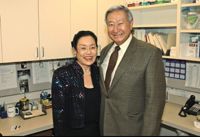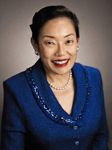- Case-Based Roundtable
- General Dermatology
- Eczema
- Chronic Hand Eczema
- Alopecia
- Aesthetics
- Vitiligo
- COVID-19
- Actinic Keratosis
- Precision Medicine and Biologics
- Rare Disease
- Wound Care
- Rosacea
- Psoriasis
- Psoriatic Arthritis
- Atopic Dermatitis
- Melasma
- NP and PA
- Skin Cancer
- Hidradenitis Suppurativa
- Drug Watch
- Pigmentary Disorders
- Acne
- Pediatric Dermatology
- Practice Management
- Prurigo Nodularis
- Buy-and-Bill
Article
California dermatologist overcomes obstacles to serve patients, specialty
Lenore S. Kakita, M.D., learned about perseverence, acceptance, determination and strength during an unlikely time. She was a United States-born Japanese toddler when the fear of "Yellow Peril" gripped the country during World War II. She spent five of the first six years of her life in U.S. relocation camps. Her father, Hajime Uyeyama, M.D., a family practitioner born in Berkeley, Calif., was forced to close his Oakland practice, and he and his family were interned at camps in California, then in Colorado.

Key Points
Lenore S. Kakita, M.D., learned about perseverance, acceptance, determination and strength during an unlikely time.

Dr. Uyeyama became a leader of the people imprisoned in the camps, advocating for them medically and for food and supplies. When the family was released in 1946, they tried to build their lives despite continuing discrimination. Dr. Uyeyama was born near the University of California, Berkeley, but after the war he could not buy property above the line of the train tracks because of his Japanese heritage.
The hurdles did not diminish her father's love for medicine, Dr. Kakita remembers.
"Dad loved medicine so much that all three children went into it. You could see what joy he received from being a doctor and helping people," she says.
Dr. Kakita was the first full-time female resident in the University of California, Los Angeles (UCLA), dermatology program in 1968. Today, she is associate clinical professor emeritus, department of medicine, division of dermatology, at UCLA's David Geffen School of Medicine.
In practice in Glendale and Pasadena, Calif., since 1971, Dr. Kakita continues to work four days a week, enjoying medical dermatology, simple cosmetic procedures (fillers and botulinum toxin injections), wound healing and skincare. Clinically, she has carved a niche as an expert in hyperpigmentation and anti-photoaging in Asians. She has been interested in alpha hydroxy acids, peptides for photoaging and wound healing, and retinoids for acne vulgaris and photoaging.
A force in medical politics
Like her father, Dr. Kakita is a passionate advocate. Not only has she focused on advocating for patients, but also for fellow practitioners. Dr. Kakita's dermatology residency mentor, Victor Newcomer, M.D., urged her to get into medical politics. By the late 1970s, after becoming heavily involved in the California Society of Dermatology and Dermatologic Surgery, she was stirring the political waters at the American Academy of Dermatology (AAD).
Dr. Kakita started on the academy's bylaws committee, setting out to change the very makeup of the AAD's board. Academies of medicine, including the AAD, were controlled by academicians, she says. To democratize the AAD board, Dr. Kakita helped make bylaws changes to assist practitioners in becoming academy board members.
"Starting in the late '70s, a lot of politics occurred in medicine. We needed to have 'doctors who were in the trenches' to be on the academy board to represent dermatology and make changes at the national level," Dr. Kakita says. "My goal was to get practitioners, women and minorities to be accepted on the academy's board."
By the early 1990s, the AAD board of directors started to represent the practitioners' needs, she says. Dr. Kakita says she was not very popular after the many changes in the organizational structure of the AAD. But she says she remembered the words of her mentor and drew strength from those. She says Dr. Newcomer would tell her that as long as her goal was always to provide the highest quality of care to her patients, she would never go wrong.

Born: August 1940 Oakland, Calif.
Medical degree: University of California, San Francisco
Internship: Children's Hospital of Los Angeles, Los Angeles
Residency: University of California, Los Angeles
Hobbies: Medical politics, lecturing, hiking, museums, playing with her grandchildren
Family: Husband, Edward, who passed away in 2005; three sons





